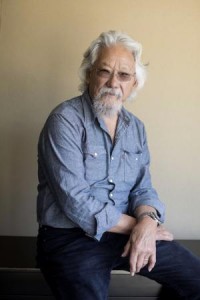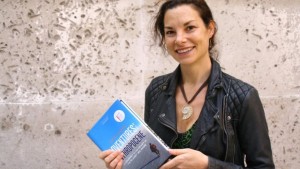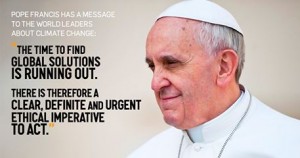
Climate Change Perspectives: Gloom and Doom or Optimism?
March 19th, 2017
Climate change is a disturbing, complex phenomenon. How should we feel about it? What is our philosophical approach?

Canadian environmentalist David Suzuki keeps smiling, despite recent comments – for example, referring to humans as an “invasive species”…
The 80 year-old Canadian and environmentalist David Suzuki has personally, for years, largely taken the “gloom and doom” approach to the matter, although his David Suzuki Foundation does seek practical solutions – for example, a nationwide price on greenhouse gas emissions. However, typically this is Suzuki’s general view:
We’re in a giant car heading towards a brick wall and everyone’s arguing over where they’re going to sit.
Help! We’re in a slow motion car wreck! Is it really as bad as that – unstoppable?
Another Canadian, writer Jack Caseros says:
That’s where we are at. As a society, our bodies and minds are in such a poor condition that we cannot touch our proverbial toes—we cannot control ourselves, yet we want to control something outside of ourselves.
I recently came across a blog from a London-based writer and journalist named Gaia Vince (Gaia, an appropriate name!) who journeyed through 40 countries and reported from the “front lines” of climate change. Her blog is called Wandering Gaia. I watched a video she posted there in which she talks about the Anthropocene (she wrote a book about it).
“I have a huge sense of optimism… We are an ingenious species,” says Ms. Vince. She truly believes that the human race will adapt (it always has)… She gave some examples of small communities finding clever ways to deal with water shortages, and the like.
So what is the Anthropocene, I hear you ask? It is a new era, an era in which the Human dominates the environment. The Human has the upper hand; it has irreversibly changed the environment at several different levels. It is really a geological term, coming after the Holocene. Remember the dinosaurs and the Pleistocene, the Pliocene and so on?
“There could be a big change,” says Ms. Vince. She believes we humans can figure out a new solution to climate change, whether it’s geo-engineering or some technological advance or creation. “We don’t know, but we have to hope, because there’s no alternative…” It was all a little too vague, for me.
Both Gaia Vince and David Suzuki do appear to agree on one thing, though: that emotional blind spot that humans have, to look far enough into the future. How can we figure out how to deal with something that many of us feel hasn’t quite happened, because we are not (yet) affected by it? This, to me, is discouraging.
Personally, I think my views fall somewhere between the two. However, I do agree with Suzuki on a number of issues; for example, he is pressing for environmental rights to be included in Canada’s Charter of Rights and Freedoms. Our Jamaican Charter already includes this (whether this right is actually being upheld in all cases is another question):
The right to enjoy a healthy and productive environment free from the threat of injury or damage from environment abuse and degradation of the ecological heritage.
“We have to understand what it means to be human,” observes Gaia Vince. Ah, but there’s the rub. Do we really understand ourselves? We caused the problem of climate change; at least we have got as far as acknowledging this (by “we” I mean the majority of scientists globally). But do we have a solution?
Pope Francis has been much exercised by this issue. At the famous Paris Conference in December 2015, he said it was a case of “now or never.” He added:
Every year the problems are getting worse. We are at the limits. If I may use a strong word I would say that we are at the limits of suicide.
Let’s see if we can at least put ourselves (and by extension, Planet Earth) on life support.
Tags: anthropocene, Canadian, Charter of Rights and Freedoms, Climate Change, David Suzuki, Gaia Vince, greenhouse gas emissions, Jack Caseros, Paris Conference, Pope Francis
The Gleaner reserves the right not to publish comments that may be deemed libelous, derogatory or indecent.
To respond to The Gleaner please use the feedback form.
- We Are the Zoomers
- Living Online with Humans and Birds: NAOC 2020
- Human Trafficking and the Problem of Public Education
- Down Memory Lane
- Are We Ready to Recover from COVID-19?
- Road Safety Matters: Is Your Vehicle Safe?
- Sexual Harassment, Me Too, and the Minister’s Disturbing Giggle
- The Vulnerable Senior Citizens, Private Care Homes and COVID-19
- A Muddle Over Masks
- Here is Something Life-Saving You Can Do: Give Blood!





